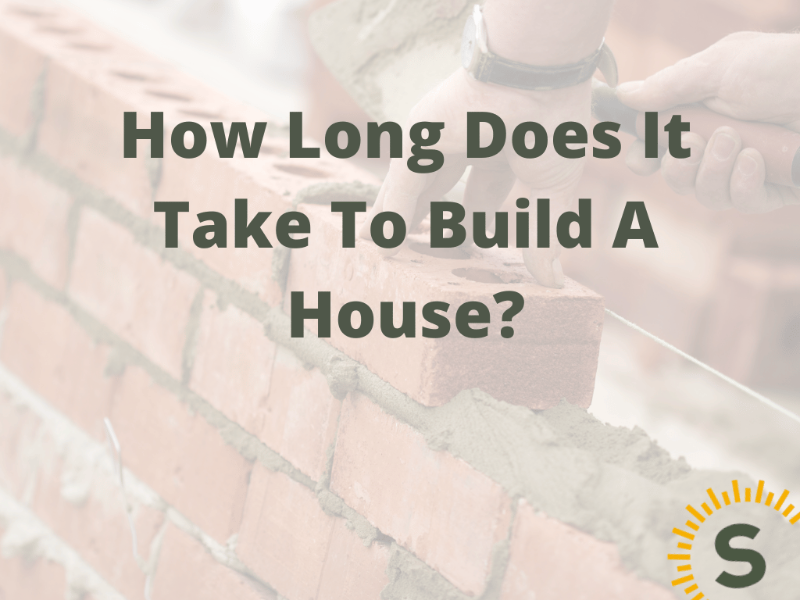
Building a house is an exciting and ambitious endeavour. It's a project that requires careful planning, coordination, and a realistic understanding of the timeline involved. Many factors can influence how long it takes to build a house in the UK, including the complexity of the design, the availability of materials and labor, and the efficiency of the construction process.
In this comprehensive guide, we will explore the different stages of building a house and provide you with a breakdown of the estimated timeframes for each phase. So, let's dive in and answer the question, "How long does it take to build a house?"
Building a house in the UK typically takes 19 to 28 months. Factors such as design complexity, planning, and construction phases influence the timeline. Streamlining the process involves hiring reputable professionals, planning ahead, and staying involved to ensure a smooth and successful construction journey.
Before we delve into the specific stages of building a house, it's important to understand the factors that can impact the overall timeline. While every project is unique, there are several common factors that can affect the duration of the construction process.
The complexity of the design plays a significant role in determining how long it takes to build a house. A pre-designed house from a builder's collection may require less time compared to a custom-designed home with intricate features and unique architectural elements.
Custom designs often involve additional time for design development, planning approval, and construction execution.
The planning phase can be a significant contributor to the overall timeline. Obtaining the necessary permits and approvals from local authorities can take time, especially if there are objections or special conditions to be met.
It's essential to factor in the time required for the planning process when estimating the construction timeline.
Preparing the construction site is another crucial factor in the timeline. This includes activities such as soil testing, land clearing, and levelling.
The condition of the site and any necessary groundwork can impact the duration of the construction process.
The availability of skilled labor and construction materials can affect the timeline of the project. If there is a shortage of skilled workers or delays in the delivery of materials, it can lead to project delays.
It's important to work with reputable contractors and suppliers who have a track record of timely delivery.
Weather conditions can also impact the construction timeline, especially in outdoor construction projects. Adverse weather conditions such as heavy rain, extreme heat, or storms can delay construction activities.
It's important to account for potential weather-related delays when estimating the overall timeline.
Now that we have discussed the factors that can influence the timeline, let's explore the different stages involved in building a house. Each stage requires careful planning, coordination, and execution to ensure a successful construction process.
The design and planning phase is the starting point of any house construction project. During this stage, you will work with an architect or designer to create a detailed plan for your dream home. The time required for this phase can vary depending on the complexity of the design and the number of revisions needed.
On average, this phase can take around 6 months, including concept development, design refinement, and obtaining planning approvals.
Before construction can begin, the construction site needs to be prepared. This involves activities such as site clearing, levelling, and groundwork. The duration of the site preparation phase can vary depending on the condition of the site and any additional requirements, such as land stabilisation.
On average, site preparation can take around 1-2 months.
The foundation and structural construction phase involves laying the foundation and erecting the structural framework of the house. This includes activities such as excavation, footings, concrete pouring, and the installation of load-bearing walls and beams.
The duration of this phase can vary depending on the size and complexity of the house. On average, foundation and structural construction can take between 2-4 months.
Once the foundation and structural framework are in place, the construction process moves on to the exterior and interior construction phases. This includes activities such as roofing, external wall cladding, installation of windows and doors, electrical and plumbing rough-ins, insulation, drywall installation, and interior finishes. The duration of these phases can vary depending on the size and complexity of the house.
On average, exterior and interior construction can take between 6-9 months.
The final stages of the construction process involve adding the finishing touches to your house. This includes activities such as painting, flooring installation, cabinetry, fixtures, and fittings. Once the construction is complete, final inspections will be conducted to ensure compliance with building codes and regulations. The duration of the finishing touches and final inspections phase can vary depending on the size and complexity of the house.
On average, this phase can take between 2-3 months.
After the construction is complete, attention can turn to the landscaping and exterior works. This includes activities such as garden landscaping, driveway installation, and the installation of outdoor amenities such as fences, gates, and patios.
The duration of the landscaping and exterior works phase can vary depending on the size and complexity of the outdoor area. On average, this phase can take between 1-2 months.
As the construction nears completion, it's important to finalise any remaining legal and financial matters. This includes obtaining the final building completion certificate, settling outstanding payments, and securing any necessary warranties or insurance.
The duration of this phase can vary depending on individual circumstances, but it typically takes around 1-2 months.
Based on the information gathered from industry professionals and experts, here is an estimated timeline for building a house in the UK:
Adding up these estimated durations, the total timeline for building a house in the UK can range from approximately 19 to 28 months. It's important to note that these estimates are average durations and can vary depending on the factors discussed earlier.
While building a house is a complex and time-consuming process, there are several steps you can take to streamline the construction process and reduce potential delays. Here are some tips to help you stay on track:
Hire a reputable architect or designer who has experience in residential construction projects. They can guide you through the design and planning phase and help streamline the process.
Work closely with your architect or designer to create a well-thought-out design that meets your needs and preferences. Clear communication and collaboration can help avoid unnecessary design changes during the construction phase.
Research and select reliable contractors and suppliers who have a track record of delivering projects on time and within budget. Request references and check their credentials before signing any contracts.
Regularly communicate with your construction team to ensure everyone is on the same page and any potential issues are addressed promptly. Regular site visits and progress meetings can help keep the project on track.
Plan ahead and order materials well in advance to avoid delays caused by material shortages or delivery issues. Work closely with your contractor and suppliers to create a detailed schedule and ensure timely material procurement.
Be prepared for unforeseen circumstances and potential weather-related delays. Have contingency plans in place and maintain open communication with your construction team to address any challenges that may arise.
Stay involved in the construction process and monitor progress regularly. This will help you identify any potential issues or delays early on and take appropriate action to keep the project on schedule.
By following these tips and working closely with your construction team, you can help minimise delays and ensure a smooth and successful construction process.
Building a house is a significant undertaking that requires careful planning and coordination. While the timeline for building a house in the UK can vary depending on several factors, including design complexity, planning, and construction phases, the estimated timeline ranges from approximately 19 to 28 months.
By understanding the different stages of construction, factors that can impact the timeline, and implementing strategies to streamline the process, you can embark on your house-building journey with confidence.
Remember to work with experienced professionals, stay involved in the process, and be prepared for potential challenges along the way. Building your dream home is an exciting and rewarding experience, and with proper planning, it can become a reality in a reasonable timeframe.

Stuart is an expert in Property, Money, Banking & Finance, having worked in retail and investment banking for 10+ years before founding Sunny Avenue. Stuart has spent his career studying finance. He holds qualifications in financial studies, mortgage advice & practice, banking operations, dealing & financial markets, derivatives, securities & investments.





Our website offers information about financial products such as investing, savings, equity release, mortgages, and insurance. None of the information on Sunny Avenue constitutes personal advice. Sunny Avenue does not offer any of these services directly and we only act as a directory service to connect you to the experts. If you require further information to proceed you will need to request advice, for example from the financial advisers listed. If you decide to invest, read the important investment notes provided first, decide how to proceed on your own basis, and remember that investments can go up and down in value, so you could get back less than you put in.
Think carefully before securing debts against your home. A mortgage is a loan secured on your home, which you could lose if you do not keep up your mortgage payments. Check that any mortgage will meet your needs if you want to move or sell your home or you want your family to inherit it. If you are in any doubt, seek independent advice.